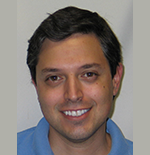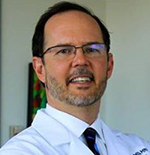Faculty - Neurobiology of Addiction Research Center
NARC Research Faculty
 |
Paul Gardner, Ph.D. The goal of the Tapper-Gardner Laboratory is to elucidate molecular mechanisms underlying nicotine’s addictive properties by focusing on the molecular targets of nicotine, neuronal nicotinic acetylcholine receptors. We study the regulation, expression, and function of these receptors in brain reward areas associated with drugs of abuse. In addition, the Tapper-Gardner laboratory is also interested in understanding how nicotine and alcohol may functionally interact within these brain regions, in an effort to explain why nicotine and alcohol co-abuse is so prevalent among alcoholics. Faculty Profile |
Contact Information Phone: (508) 856-4035 Fax: (508) 856-2627 |
 |
Gerardo Gonzalez, M.D. Gerardo Gonzalez, MD is an Associate Professor of Psychiatry, Director of Addiction Psychopharmacology Research Unit, Director of Addiction & Comorbidity Treatment Service (ACTS) and Director of the Addiction Psychiatry Fellowship program at the University of Massachusetts Medical School and UMass Memorial Medical Center. His research has focused on the neurobiology and pharmacotherapy of cocaine and opioid dependence. Specifically, his studies have evaluated the extent that enhancing GABA neurotransmission may have in modifying cocaine and opiate taking behavior. In addition, his current project is evaluating whether modulation of glutamate neurotransmission by NMDA receptor antagonist during opioid agonist treatment may improve treatment outcomes and reduce early relapse in young adults with opiate dependence. Faculty Profile |
Contact Information Phone: (508) 856-4035 Fax: (508) 856-2627 |
 |
Jean King, Ph.D. Our laboratory focuses on the neuronal networks sub-serving mental health disorders and addiction. In a recent technological advance, we developed the capability to assess changes in regional brain activity in fully conscious rats using ultra-high field functional magnetic resonance imaging (fMRI). Utilizing this technology, we are able to explore the responses to cognitive and addiction-related cues in fully conscious rats. Our current proposal explores the role of the cholinergic system in ADHD by exploring the impact of nicotine exposure on measures of cognition and addiction in an animal model of ADHD as manifested through changes in behavior, brain activation, and nicotinic receptor subunit gene expression. Faculty Profile |
Contact Information Phone: (508) 856-8035 Fax: (508) 856-8090 |
 |
Gilles Martin, Ph.D. All forms of addictions have been extensively studied over the past two decades. Research has clearly established that they are all found in a limited number of brain regions, including the nucleus accumbens (see picture above), which is part of the reward pathway. Our main objective is to understand how drugs of abuse like alcohol alter electrical messages received and sent by neurons from this brain region. The use of sophisticated electrophysiological techniques enables us to measure ionic currents flowing through the membrane of neurons, currents that represent the fundamental building block of neuronal communication. Faculty Profile |
Contact Information Phone: (508) 856-4073 Fax: (508) 856-2627 |
 |
Haley Melikian, Ph.D. The addictive process converges on the dopaminergic pathways in the brain. A central protein in dopamine signaling is the plasma membrane dopamine transporter, which is responsible for removing synaptic dopamine following release. The dopamine transporter is the primary target in the brain for a number of addictive substances, including amphetamines and cocaine. Our lab studies how cellular signaling regulates dopamine transporter function and presentation at the plasma membrane. It is our hope that shedding light on intrinsic mechanisms that control dopamine transporter function will lead to innovative new treatments for addiction. Faculty Profile |
Contact Information Phone: (508) 856-4045 Fax: (508) 856-2627 |
 |
Evgeny Rogaev, Ph.D. Dr. Rogaev’s laboratory is interested in three research aspects related to addiction: 1) evolution of genes for addiction and distribution of alcohol susceptibility gene variations in a recent history of human populations; 2) search for genetic risk factors contributing to alcoholism using ethnic population case-control cohorts and genomic approaches and 3) the role of non-coding micro RNA in alcohol-modulated regulation of gene expression (mentor of A. Pietrzykowski K08 NIAAA grant award). Faculty Profile |
Contact Information Phone: (508) 856-8438 Fax: (508) 856-2627 |
 |
Andrew Tapper, Ph.D. The goal of the Tapper-Gardner Laboratory is to elucidate molecular mechanisms underlying nicotine’s addictive properties by focusing on the molecular targets of nicotine, neuronal nicotinic acetylcholine receptors. We study the regulation, expression, and function of these receptors in brain reward areas associated with drugs of abuse. In addition, the Tapper-Gardner laboratory is also interested in understanding how nicotine and alcohol may functionally interact within these brain regions, in an effort to explain why nicotine and alcohol co-abuse is so prevalent among alcoholics. Faculty Profile |
Contact Information Phone: (508) 856-8164 Fax: (508) 856-2627 |
 |
Douglas Ziedonis, M.D., MPH Douglas M. Ziedonis, MD, MPH, is Professor and Chair of the Department of Psychiatry at the University of Massachusetts Medical School and UMass Memorial Medical Center. Dr. Ziedonis is an internationally recognized leader in co-occurring mental illness and addiction, in particular tobacco dependence. He has served as an advisor to President Bush’s New Freedom Commission on Mental Health, a Senior Fellow for SAMHSA’s Co-Occurring Disorders Center for Excellence, and on various NIDA/NIMH study sections and advisory groups on addiction and mental illness. Faculty Profile |
Contact Information Phone: (508) 856-3066 Fax: (508) 000-0000 |


